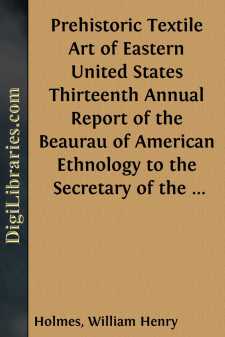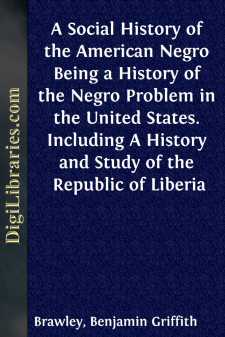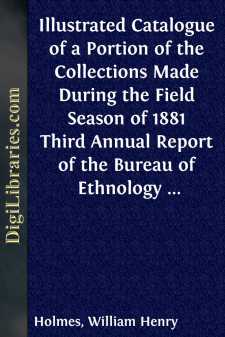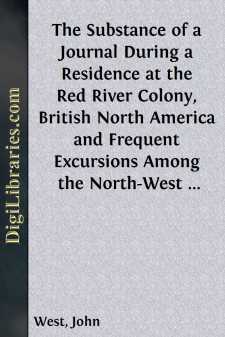History
- Africa 30
- Americas (North Central South West Indies)
- Ancient 68
- Asia 58
- Australia & New Zealand 8
- Canada 41
- Caribbean & West Indies 1
- Civilization 20
- Eastern Europe 12
- Europe 310
- Expeditions & Discoveries 60
- General 77
- Historical Geography 1
- Jewish 9
- Latin America 3
- Medieval 8
- Middle East 13
- Military 248
- Revolutionary 8
- Study & Teaching 5
- United States 353
- Western Europe 56
- World 13
Americas (North Central South West Indies) Books
Sort by:
SCOPE OF THE WORK. About the year 1890 the writer was requested by the Director of the Bureau of Ethnology to prepare certain papers on aboriginal art, to accompany the final report of Dr. Cyrus Thomas on his explorations of mounds and other ancient remains in eastern United States. These papers were to treat of those arts represented most fully by relics recovered in the field explored. They included...
more...
LAKE OF TACARIGUA. HOT SPRINGS OF MARIARA. TOWN OF NUEVA VALENCIA DEL REY. DESCENT TOWARDS THE COASTS OF PORTO CABELLO. The valleys of Aragua form a narrow basin between granitic and calcareous mountains of unequal height. On the north, they are separated by the Sierra Mariara from the sea-coast; and towards the south, the chain of Guacimo and Yusma serves them as a rampart against the heated air of...
more...
CHAPTER I THE COMING OF NEGROES TO AMERICA 1. African Origins An outstanding characteristic of recent years has been an increasing recognition of the cultural importance of Africa to the world. From all that has been written three facts are prominent: (1) That at some time early in the Middle Ages, perhaps about the seventh century, there was a considerable infiltration of Arabian culture into the...
more...
CHAPTER I HOW SLAVERY GREW IN AMERICA An English traveler, riding along the banks of the Potomac in mid-July, 1798, saw ahead of him on the road an old-fashioned chaise, its driver urging forward his slow horse with the whip, until a sharp cut made the beast swerve, and the chaise toppled over the bank, throwing out the driver and the young lady who was with him. The traveler—it was John Bernard, an...
more...
CHAPTER I. THE UNITY OF MANKIND. The Biblical Argument.—One Race and One Language.— One Blood.—The Curse of Canaan. DURING the last half-century, many writers on ethnology, anthropology, and slavery have strenuously striven to place the Negro outside of the human family; and the disciples of these teachers have endeavored to justify their views by the most dehumanizing treatment of the Negro....
more...
THE DAYS OF THE SPINNING-WHEEL IN NEW ENGLAND. * * * * * WITHIN the last few years many young ladies have searched country houses or ransacked old garrets to find spinning-wheels, which, like old chairs, tall clocks, and warming-pans, have now become objects of curiosity and interest to those who take a fancy to antique articles. It has become fashionable to have these things to adorn our Queen Anne...
more...
INTRODUCTORY. Mr. Palmer began his explorations early in July, 1881, and continued with marked success until the end of the year. He first paid a visit to the Cherokee Indians of North Carolina, and collected a large number of articles manufactured or used by this people, besides a number of antiquities from the same region. From Carolina he crossed into Tennessee, and began work by opening a number of...
more...
SOME STRANGE AND CURIOUS PUNISHMENTS. In the month of January, 1761, "Joseph Bennett, John Jenkins, Owen McCarty, and John Wright were publickly whipt at the Cart's Tail thro' the City of New York for petty Larceny,"—so the newspaper account states,—"pursuant to Sentence inflicted on them by the Court of Quarter Sessions held last Week for the Trial of Robbers," etc. In...
more...
The conditions which govern the Indian's occupation of his Reserve are, probably, so well known, that any extended reference under this head will be needless. He ceded the whole of his land to the Government, this comprising, originally, a tract which pursued the entire length of the Grand River, and, accepting it as the radiating point, extended up from either side of the river for a distance of...
more...
by:
John West
DEPARTURE FROM ENGLAND. ARRIVAL AT THE ORKNEY ISLES. ENTER HUDSON'S STRAITS. ICEBERGS. ESQUIMAUX. KILLING A POLAR BEAR. YORK FACTORY. EMBARKED FOR THE RED RIVER COLONY. DIFFICULTIES OF THE NAVIGATION. LAKE WINIPEG. MUSKEGGOWUCK, OR SWAMP INDIANS. PIGEWIS, A CHIEF OF THE CHIPPEWAYS OR SALTEAUX TRIBE. ARRIVAL AT THE RED RIVER. COLONISTS. SCHOOL ESTABLISHED. WOLF-DOGS. INDIANS VISIT FORT DOUGLAS....
more...











